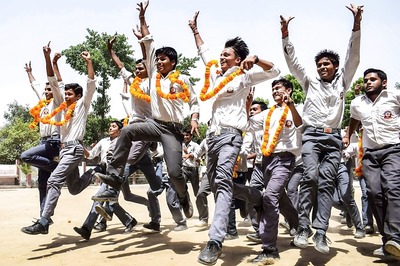
views
On her visit to Birbhum, Mamata Banerjee had asked her party leader Anubrata Mandal to be careful and, perhaps, most importantly, advised him to “fight like a tiger”.
The Election Commission, meanwhile, has kept the TMC leader under strict surveillance, while the Lok Sabha seat goes to poll on Monday.
Mandal is officially the president of Birbhum’s Trinamool unit. However, the leader, who has reportedly asked party leaders to throw bombs at police, burn down houses of independent candidates and threatened to chop off hands of Congress leaders, is much more than that.
“He epitomises the violent nature of Bengal politics. It is something that the TMC has inherited from the CPI(M) and it is something that will continue even if some other political party takes over,” said a TMC MP from south Bengal.
Even as Mondal remained under lock and key, constant surveillance and without any access to mobile phones, Birbhum saw clashes between TMC and BJP supporters in Nanoor which injured nine people.
The district’s BJP candidate Doodh Kumar Mondal is also reportedly under the EC scanner after he was seen using a mobile phone inside a booth. The Trinamool Congress had won 87% of the gram panchayat seats uncontested in last year’s polls that were marred by violence.
Meanwhile, Asansol also witnessed clashes, with the car of Union minister Babul Supriyo allegedly being vandalised outside a polling station. Both the Trinamool and BJP have accused each other of instigating violence and malpractice.
The Congress, meanwhile, at Behrampur, has alleged proxy voting stating that there was no security arrangements at a booth and that their polling agent being barred entry.
With violence punctuating the election, the Trinamool Congress supremo has consistently claimed that officers sent by the Election Commission (EC) as special observers were insulting the people of West Bengal, that the BJP was trying to run a parallel government in the state through two retired officers.
Banerjee’s allegation of a biased Election Commission working to aid the BJP isn’t new. Neither is the EC’s stance that in spite of electoral reforms across the country, malpractices in Bengal remain a constant.
But political leaders from both the BJP and TMC admitted that the stakes in 2019, that have already seen violence in the state, allegations of voter intimidation and a missing polling officer, were much higher.
With Banerjee pitching herself for the country’s top job and the BJP looking to win 20 seats in the state, one BJP leader said, “Violence was inevitable.”
‘Scientific Rigging Machinery’
While in opposition, Banerjee had famously accused the Jyoti Basu-led Left Front government of creating a ‘scientific rigging machinery’. This, officials in the EC and state police told News18, still exists and is constantly evolving.
“Traditionally, the party in power would try and enroll bogus voters, or identify and delete names of people who’re likely to vote against them. Driving out polling agents of rival parties… this happens less now,” said an EC official.
Instead, the focus — two decades since former CEC TN Seshan effectively cleaned up elections elsewhere in the country — is on more subtle forms of intimidation and the “perfecting of the CPI(M)’s surveillance machinery that the TMC inherited”, said a senior IPS official.
“If anything, the CPI(M) was an organised party. The TMC is more dis-organised, so the results are often more visible, but equally effective,” he added.
However, with electoral roll cleansing topping the priority list of the EC, the opposition alleged the TMC’s focus was instead on surveillance.
A BJP state committee leader told News18, “In Bengal, everyone knows which ward they live in. Something unheard off in many parts of India. This is a legacy of the Left which organised its party down to the ward level. The TMC doesn’t have the same structure, but it has a network of clubs that operate out of different areas and have the same function.”
The function of this state machinery, the leader explained, is “to act as an all-seeing, all-knowing extension of the party that, most importantly, knows who will not vote for it.”
‘Violence is Inevitable, But Not Random’
“Jhamela to hobe (clashes will take place),” said a TMC leader in Barrackpore, when asked about the possibility of violence in the seat that will see the party’s Dinesh Trivedi square up against former TMC strongman-turned-BJP-candidate Arjun Singh.
The TMC has alleged on multiple occasions that Singh had violated the Model Code of Conduct and had been threatening party workers.
“A number of party workers have been threatened and many, out of fear, have joined the BJP. This changes the ground reality on the day of the polls,” said the TMC leader.
Political violence and voter intimidation, the leader said, were just “part and parcel of the politics here”. And, he doesn’t seem to be wrong.
Consider this: During the second phase, when Darjeeling, Raiganj and Jalpaiguri went to polls, incumbent Raiganj MP Mohammed Salim’s car was vandalised when he went to cast his vote within 100m of a polling station in Islampur’s Patagara.
Elsewhere, a journalist, trying to film locals who claimed that they weren’t able to vote, was allegedly attacked by TMC cadres in Raiganj.
Locals of Chopra in Darjeeling blocked a national highway, claiming they weren’t able to vote. In Jalpaiguri, a TMC cadre allegedly fired near a polling station.
“Violence is inevitable here. But it is not random,” said a retired IAS officer, on the condition of anonymity.
“In Bengal, before an election, leaders will sit down with the details of a seat. Which ward had voted for whom (in the last election), where, say the BJP had led or where the TMC had a lead. Then on the basis of that, and on the basis of inputs from the local leadership, the violence on the polling day would be directed. Take Jalpaiguri for instance, after the shots were fired, no one came to vote for hours. That is a very subtle form of voter intimidation,” the officer said.
Ahead of the 2016 election, Lodhna village in Bardhaman’s Khandagosh Assembly constituency, an area once synonymous with the Left and the manufacturing of bombs for ‘political purposes’, post-poll violence led to the death of two CPI(M) party workers.
Mohammad Saifudin, a local, told News18, “Until then, many in the village were still holding on to the belief that the Lal party (Left) would come back with support from the Congress. After the deaths and the result, the village sullenly switched over to the TMC. It was a clear message.”
The retired official added, “This isn’t to say that it is localised to one party. Where the BJP is strong, it will do the same thing. Since the TMC, like the Left before, dominates the state, you heard about them more. This is just how elections are done in this state.”


















Comments
0 comment